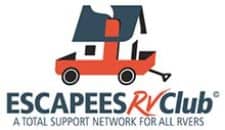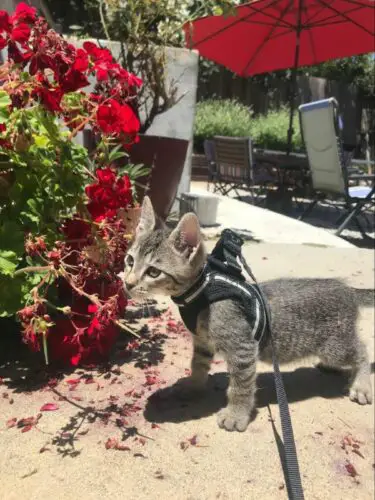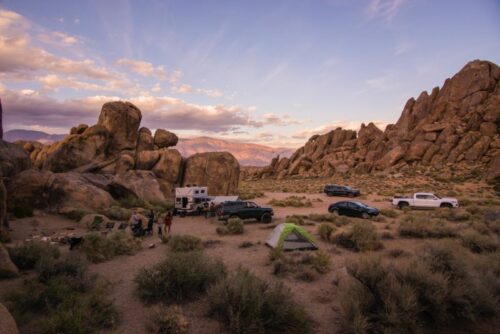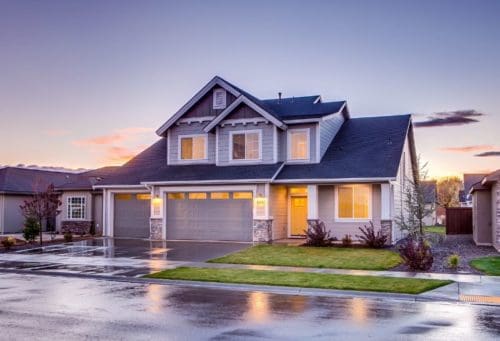You’ve seen all the videos and testimonials of people who have converted to Van Life. It speaks to your inner free spirit and longing for the open road. It seems too good to be true.
Well, it might be, if you can’t handle some of the harsh realities that come with living on an RV full-time. Below are the top harsh realities of Van Life that you should understand before committing.
1. ROAD ANXIETY
Unless you are comfortable driving big rigs, the change will most likely be a shock to your system. A much longer, taller, and often wider vehicle means very different boundaries than what you are used to. You will need to know your boundaries like the back of your hand and even then there will most likely be some anxiety-inducing moments going under a bridge or taking a turn. High winds can tip over tall vehicles as well. In general, when you live on the vehicle you are driving, if something happens, it impacts your life more than it would have pre-Van-Life.
While this anxiety typically reduces the more you get out there, many van lifers admit to still having some road anxiety. It’s an unfortunate reality when you are literally driving with your whole life and home with you.
2. HANDYMAN BY FORCE
Things will break. Consistently. Constantly. Repeatedly. Many van lifers have a running list of five or six things that are broken at any given time. Continually taking the RV into body shops to get it fixed can get expensive. Many places may not have the specialized parts or the trained technicians to work on an RV.
Therefore, you will need to learn how to do a lot of the little repairs on the road yourself. While many say that most of the repairs are relatively easy to learn how to do, you will need to put in the effort to figure it out and do it yourself on the regular.
3. KEEPING COOL IN SUMMER/WARM IN WINTER
Even the most expensive RV is not built the same as a house. The design of a home on wheels makes it very different than owning a brick-and-mortar stationery home. One, in particular, is maintaining a pleasant temperature.
Even if your RV has an HVAC system of some kind, anyone who has spent a night in their car or gone camping will tell you it is very different than spending the night in a home with an HVAC system. Summers will get hot, especially if you are in a warm location like the Southern U.S. Winters will be cold, especially if you are in a cold location like the Northern U.S. To a degree, you can simply make sure to summer or winter in a better climate, but it will rarely be perfect and certainly not every day for the whole season every year.
4. CLOSE CRITTERS
Yet another lovely side effect of living in a home on wheels. Sure, any home can get critters and pests such as bugs, mice, squirrels, etc. In an RV, it can happen more frequently since you are often out in nature more and have to worry about things getting in if you don’t close the door properly every time, etc. They can also potentially get in through the engine. Any unsealed windows or doors will invite things in especially to escape the climate outside.
Battling pests is a common occurrence on an RV and one that you will need to be prepared for. The same solutions that work in a house typically work on an RV (traps, bug bombs, etc.), but may impact you and any others living with you more than if you were in a house, such as having to get a hotel for the night to bug bomb your RV and let it air out before you go back to living in it.
While not drastically different than what you would have to do in a house, again, it will be more likely to happen and can potentially ruin things like your hoses, electrical equipment, etc. that you will need for your RV to function and costly repairs that could impact your plans and your very home cause more stress. In addition, thinner walls make it more unsettling than in a house.
5. QUESTIONABLE HYGIENE
You’re gonna lie about how often you shower. It’s just gonna happen. Even RVs with full set-ups for showers, toilets, and dishes are not the same as doing those activities in a house. Showers in particular will not feel like your shower at home. They are smaller and designed for basic utilitarian use, making them not nearly as comfortable, especially if you are bigger/ taller.
And while you may need to worry about water and electric bills at home, you often don’t need to worry about running out of water in the middle of a shower. Knowing the level of your tanks and your usage on a daily and weekly basis is vital.
Don’t worry. You can still stay clean and healthy. It will most likely just be closer to camping.
Thankfully there are some options to help you out. You can look for campgrounds that have showers. You can also plan for a hotel stay every once in a while just to have a “normal” shower. A popular hack is to get a gym membership for a national chain and then use their showers.
6. DAILY UNCERTAINTY
As much as you may want to just be a free spirit and go where the wind takes you, it’s almost a sure-fire way to run into trouble. Even when you plan ahead (mapping out your route, doublechecking height clearances, finding and booking campgrounds, planning extra breaks and time), you can still run into unexpected issues.
Even going grocery shopping or doing a supply run can cause anxiety depending on where you are. How close is the nearest grocery store? Will it have what I want? Will I be able to make a quick trip in and find what I need or spend unavailable extra time trying to navigate confusing aisles?
You, unfortunately, can’t trust everything that’s online, and a lot of these details are still not readily accessible online. It’s getting better, but it’s still not perfect yet.
- There are apps that will help you map out your route for your RV.
- There are forums to ask questions both on RV-specific sites and more mainstream forums like Facebook and Quora.
- Many campgrounds have websites that even allow booking online.
- Many national chain grocery stores now have apps to order items ahead of time and have them waiting for you when you arrive. Many will even bring the bags directly to your vehicle.
However, at the end of the day, you won’t know all the details until you get there, which can cause anxiety.
- There could be a detour due to construction that is not RV-friendly. The app may not be updated for this area. You may have no service in this area.
- Getting specific answers to your specific questions on forums can be difficult, even if you know what to ask. And their experience may not be the same as yours for any number of reasons.
- Calling a campground ahead of time is always better than just checking the website even in today’s day and age. Understanding campground restrictions, in particular, can be frustrating using just their website. It is far better to call them up and explain your vehicle, if you have any pets, the expected times of arrival and departure, etc. and see what they say based on their restrictions.
- You do not want to pull up to a campground and be turned away for the length of your RV, the age of your RV, your pets, the time you show up, or any other random restriction they choose to have.
- There are issues with grocery store apps sometimes. The app may be down. They may not actually have the item you are looking for and have different rules on whether the stocker will pick what they consider to be a valid substitution or simply leave it off your list. Depending on where you are going, you may not be near even the most prevalent of national chains. The information on stores in that area may also be out of date. Do what you can to always have emergency rations and supplies and stock up before going to an area where there may be issues.
These uncertainties and unknowns will cause anxiety and frustration. Do what you can to plan ahead, but know you will often have to go with the flow and figure out a solution at the last minute.
7. POOR DESIGN IS STANDARD
It can be very hard to know what you will need for your trips, especially when you are just starting. It can be hard to know how annoying certain designs will end up being after several months or years on the road. Especially if you are getting an RV cheap, you may be willing to forgive certain design choices for the price… until you are living with it every day.
Those cabinets don’t quite do the job you want them to. That wall that provides privacy ends up being an annoying waste of space. The kitchen table nook/ bed/ couch works for a weekend trip but is horribly uncomfortable when you are using it every day. Some of these can be fixed later with minor or major changes to the vehicle. Some are permanent.
Even if you are custom designing your RV, it can still be hard to think ahead of every possible situation. These little things will wear on you as time goes on. Or you may find that it works on your trips. Then you do a trip that is a bit different than what you have done in the past and it’s much more frustrating or even unusable in those types of trips. Later, you can plan not to do those trips (though that is again frustrating to limit yourself), but in the moment it can ruin a trip.
8. CELLULAR SERVICE IN THE BOONDOCKS
If you are hoping to work remotely or even just have basic access to the internet and cell service, things can get tricky if you also want to hit the back roads. Service can be spotty to non-existent in more rural areas, making access difficult. Even if there is normally service, something can go wrong such as cell towers needing to be repaired.
To combat these issues, many van lifers have hot spots with at least two different carriers to help increase the chance the one of these will be able to get a signal. You may also have to camp out in a local cafe or library for the day to do work.
9. IT’S NOT NECESSARILY CHEAPER THAN (X)
Many of the van lifers on social media will tout the savings that they earn every month by living out of their vehicle instead of paying rent. However, there are many new and increased costs to consider about Van Life before you take the plunge. You may not be saving as much as you hope.
- The cost of the RV: RVs are not necessarily cheap. You may be able to get a used older model for cheaper than a new one, but you may have to sacrifice a lot of the perks that you want. The wear and tear, as well as maintenance on an older vehicle, may end up being expensive over time as well.
- Gas: If you are on the road, you will be needing gas to go where you want. This will most likely be more than you would normally use in your normal commute and pre-Van-Life days. In addition, your mileage will likely not be as good as your personal car, meaning a general increase in your gas budget. $3,000 in gas for a year on the road is not unrealistic and may even be a low ball figure depending on your rig, driving time for the year, and general gas prices in the areas you are going.
- Maintenance: As discussed previously, things will break and you will have to fix them or pay to have them fixed. This can get expensive quickly even if you are doing it yourself.
- Groceries: Grocery prices range across the country. In addition, it might take a bit to figure out your food needs and wants as well as your schedule taking your fridge into account. Food may go to waste or you may need to purchase emergency rations that end up being more expensive than you normally would spend because it’s the only option around.
- Campground rates: While campground rates may be cheaper than hotels (not always depending on the campground, the size of your rig, and other potential upcharges) you are also looking to do this on a regular basis versus a few days or even a few weeks of vacation. These costs add up when you are staying at campgrounds most nights of the year. There are some free options available, but not always.
10. TRICKY LEGALESE
Technically, living out of your van is legal. However, state and federal laws want you to have a physical address. It is highly recommended to have some sort of permanent address that you can list for legal purposes. A P.O. Box should cover you or if you have family who is willing to have you list them as a permanent address and you can use them as a hub, every once in a while, that could be a good option as well.
State laws vary drastically on what you can and can’t do in regards to sleeping in your vehicle. Make sure to do research on what your current state allows as well as the states you want to travel to. In general, the following places are illegal to park and live in your van:
- In parks
- Busy streets and highways
- Front of businesses
- In neighborhoods
- In government parking lots
- Rivers and under bridges
However, you can ask businesses with large parking lots like Walmart, especially ones that sell outdoors and camping equipment. Other places include:
- Rest Stops
- Truck Stops
- RV parks or campgrounds
Okay, so general legality out of the way, let’s dive into some of the other issues that can crop up from you living on your RV. Check with your insurance to see if there are any rules about where they are covered. Health insurance in particular can get dicey. Many plans only cover specific locations and even telehealth appointments currently require physicians to be certified in the state YOU are in, not just the state THEY are in.
Even your vehicle’s insurance, registration, and inspection can get tricky depending on your state’s regulations. Many require you to have vehicle insurance for the state you live in to register your vehicle for the state you live in. This mostly just requires you to have a hub of some kind and plan to return on at least an annual basis to deal with these legal details.
11. RIG DISCRIMINATION/ANTI-RV COUNTIES
While you may be able to pull over and park in a Wal-Mart parking lot or another overnight parking area in most places, not everywhere is as friendly for RVs. Some counties have laws in place that make it rather difficult to live in an RV. Knowing RV-related laws for the areas you want to go to is crucial, just in case.
In addition, many people also have preconceived notions of the types of people who live in RVs and come through their town. They tend to put you into one of three categories:
- On the road because you have the money to travel this way
- Tourists
- Homeless and forced to live this way to survive
If your RV looks run-down not nice, they will automatically put you in the last category and may treat you rudely. Places may not allow you to stay the night based on this. Keeping your rig looking nice will help keep you in the first two categories in people’s minds and hopefully make the experience better.
12. THE EMOTIONAL TOLL
There are a lot of beautiful things about living on the road, but there are a number of things that can make it difficult for your emotional and mental health in the long term.
- It can get lonely: You will meet a lot of cool people, but you will also leave a lot of friends and family behind. Your social life kind of dies or at least takes a hit since you won’t be close to friends and family all the time to hang out. Video calling can help, but it is still different and some may even resent you for choosing this life.
- Downsizing: It’s an obvious chore that has to happen to dedicate to van life, but one some are not prepared for. You will typically need to downsize a lot to go from living in a house or even an apartment to living in an RV. While the 65” tv or walk-in closet full of clothes may not be an issue to leave behind, family memorabilia most likely will be hard to make a decision on. You can get a storage space to hold stuff that you don’t want to give away, but that also means that it stays there and not with you.
- Emotions feel bigger in a small space: It’s a phrase you don’t understand until you drastically downsize, especially with other people. Everything’s just so tight. Everyone’s in each other’s business. It’s hard to separate yourself from others in an RV. You will still see, hear, and feel them moving around. Even if you can close a door or curtain or put on noise-canceling headphones, it’s hard to forget that you are on a rig with others. And if you are alone, it can be felt more when in a small space like an RV. Tensions will run high. Things will not go according to plan. It all adds up.
- For every morning with a gorgeous vista, there’s a morning with a parking lot: You may be thinking about the RV life, specifically for the chance to travel and see beautiful things every day. And you will see a lot of beautiful things during your time, but it won’t be all the time. Your parking spots won’t always be the gorgeous view you want, especially if you are trying to save money. This phrase also works in a metaphorical sense. It’s still life. There will be amazing days and there will be days where nothing goes right. It may even be harder and/or more expensive to fix the things that go wrong than it would if you were going home at the end of the day.
Focus on your emotional and mental health. Make sure you are taking time to yourself if you are living with others on the RV. Whether you are living with others or alone, make sure to get out and meet people during your travels to change things up and get other social interactions. Look into therapeutic hobbies and activities that will help keep you on top of your A-game, even when things go wrong.
While these may seem like a lot, most Van Lifers will tell you it’s all worth it. Living in a brick-and-mortar stationery home has its own harsh realities too. We’re just more used to them because they are “normal” in society. As long as you know both the pros and the cons of van life and are willing to accept all of them, you are going to be okay and probably love it most of the time.
There’s also a lot of people and resources out there to help you in this day and age thanks to the Internet and different technological advances. Videos by van lifers have helped new van lifers transition more easily. Forums have helped the RV community across the nation come together to help each other out. The Internet is full of places to help you learn about how to deal with these harsh realities.
Sarah Hoffschwelle is a freelance writer who covers a combination of topics such as science, self-development, art, and societal commentary. In the past, Sarah worked in educational nonprofits providing free-choice learning experiences for audiences ages 2-99.
-
Sarah Hoffschwellehttps://changingears.com/author/sarah-hoffschwelle/
-
Sarah Hoffschwellehttps://changingears.com/author/sarah-hoffschwelle/
-
Sarah Hoffschwellehttps://changingears.com/author/sarah-hoffschwelle/










